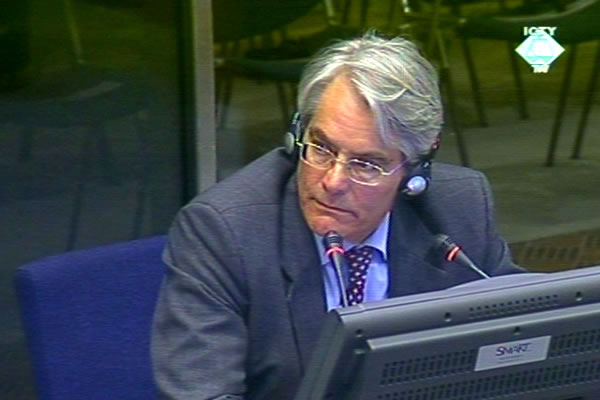Home
GENERAL RUPERT SMITH: ‘KARADZIC OUT OF TOUCH WITH WORLD’
British general Rupert Smith, the last commander of UNPROFOR in BH, began his evidence at the trial of Radovan Karadzic. Smith described how the relations between the Bosnian Serb political and military leadership on the one hand and the UN on the other deteriorated in the first half of 1995
 Rupert Smith, witness at the Radovan Karadzic trial
Rupert Smith, witness at the Radovan Karadzic trial In early 1995, British general Rupert Smith had a series of meetings with the Bosnian Serb political and military leadership, either alone or with Yasushi Akashi. At the meetings, Smith tried to ensure the compliance with and extensions of the ceasefire agreement. Based on the meetings, he formed an impression of Karadzic, Mladic, Krajisnik and other people from Pale.
In his evidence today at the trial of Radovan Karadzic, former UNPROFOR commander in BH said he thought ‘Dr. Karadzic and others were very largely out of touch with and unaware of the world outside them, of the little world of Pale.’ As time went by, General Smith ‘became increasingly of the view that they were uncaring of the world outside and what people perceived of them, but also what their actions might provoke in the way of reaction by the outside world in a different understanding".
Despite all that, Karadzic and Mladic ‘were indeed what they said they were’: clearly the leading figures among the Bosnian Serb, General Smith said. They ‘knew what they were doing’ and Smith understood that together with several other persons – like Krajisnik and Koljevic – they ‘functioned as a whole’. Although there was some friction at times between the political and military leadership, General Smith said he had ‘no doubt that those two wings represented a whole that was moving in the same direction’.
In General Smith’s examination-in chief today, the prosecutor tendered into evidence dozens of UN documents. The documents describe various meetings at Pale, General Smith’s or Akashi’s protests over the attacks on protected areas, blocking of humanitarian convoys, cutting off supplies for UNPROFOR in the eastern enclaves and sniper and artillery incidents. As a rule Karadzic and Mladic responded to the protests by denying Bosnian Serbs were responsible and accusing UN of partiality and supporting the government forces.
The attitude towards the UN troops deteriorated gradually. In early April 1995, Karadzic issued a threat: if NATO launched air strikes, the Bosnian Serbs would consider UNPROFOR an enemy army and attack them with the weapons that had not been used before, held by the paramilitaries. Such ‘half-baked threats’ had been issued before, General Smith said today.
General Smith claims that in the spring of 1995 both sides wanted to achieve a military solution. The Bosnian side controlled little territory with a large number of soldiers; as days went by, they got more and better arms and improved their organization, Smith explained. On the other hand, the Serbs held large swathes of territory but had fewer troops: they couldn’t defend what they had won, but weren’t ready to withdraw, relying on their firepower. The Serbs’ main problems were enclaves in the rear, because their soldiers were tied down there. The decision to reduce the enclaves down to a small area that could be controlled with a small force was motivated by this problem.
Two incidents in the second half of May 1995 – the removal of the heavy artillery from the collection points around Sarajevo and intensified shelling of civilian targets in the city – led General Smith to call in NATO air strikes, he explained today. Akashi authorized the air strikes and on 25 May 1995, NATO aircraft hit several bunkers in the ammunition depot near Pale. Mladic’s troops responded by opening intense artillery fire on all protected areas. Worst-hit was in Tuzla, where some 70 persons were killed when a shell impacted on the town main square. The UN and NATO responded with more air strikes on 26 May 1995. Mladic’s troops retaliated by taking about 300 UN staff hostage and using them as human shields. According to General Smith, the documents shown by the prosecutor today clearly indicate that the Republika Srpska president authorized the action, or at least knew about the treatment of UN staff.
General Smith continues his evidence tomorrow.
Linked Reports
- Case : Karadzic
- 2011-02-03 ‘MAPPING’ THE SNIPER TERROR CAMPAIGN IN SARAJEVO
- 2011-02-02 UN IN BOSNIA ‘A WARRING SIDE, NOT PEACE-KEEPING FORCE’
- 2011-02-01 KARADZIC: INVESTIGATIONS WERE DONE USING STICKS AND PIECES OF STRING
- 2011-02-09 MLADIC’S INTENTIONS IN SREBRENICA WERE MISREAD
- 2011-02-10 WAS GENERAL SMITH ‘FASCINATED’ WITH RATKO MLADIC?
- 2011-02-11 WHO HAD THE OBLIGATION TO DEMILITARIZE PROTECTED AREAS
